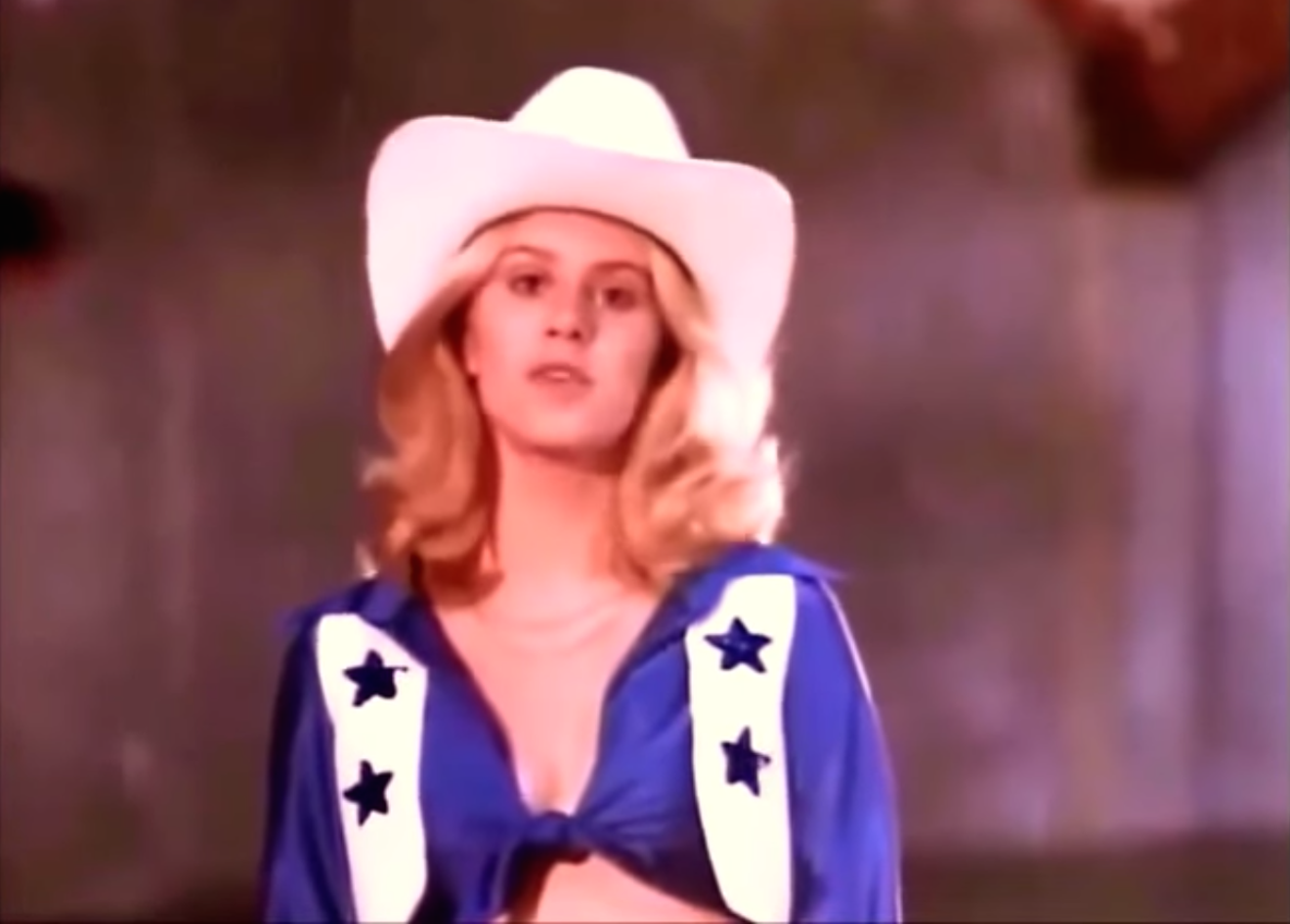It didn’t get far off the ground. Not Right Productions held two rounds of auditions, but fewer actors showed up than make up the cast of the musical.
Here is the plot if you aren’t familiar with the title or are pretending you’re not to save yourself some embarrassment. The 2002 off Broadway musical is based on a famous 1978 pornographic film in which a high school cheerleading squad raises money to pay for a friend’s trip to Dallas so she can try out for the “Texas Cowboys” cheerleading team. Debbie and her friends start by doing odd jobs around their tiny town, but they all lead to sexual transactions in some form or another.
The musical itself is nowhere near as graphic as the source material. The closest the play gets to nudity is a suggestive use of a banana. The only
“The girls, a couple of them are basically in bikini tops and ... as close as it gets, [Debbie] lets a character touch her, and that’s when Debbie gives in and it’s the whole message of the story,” McKenzie says. “Here’s a young girl who has a dream, and she basically has to deal with the consequences of her actions to achieve that dream and determine what’s right and wrong for her, how it affects her, how it affects her friendships and her career. I guess she has a little bit more in that regard but nothing is overtly sexual.”
It’s also not exactly virgin (pun intended) territory for Dallas-Fort Worth’s fringe theater community. Kitchen Dog Theater produced the show during its 2005-2006 season. This time, Rover Dramawerks — a theater space in Plano known for staging unusual productions — gave Not Right Productions a space to put on their show. But after they sent out an audition notice in October, McKenzie says they didn’t attract many actors.
McKenzie and company assumed the rehearsal schedule’s overlap with the holidays might have scared some people away, so they held a second round of auditions in December with plans to start rehearsals in January. The turnout total was bigger, but not by much. Only five people showed up, including one man and four women, whereas they needed five actress and three actors playing multiple parts to make up the cast.
“After the auditions, I reached out to some people and tried to get in touch with some actors that we knew and some additional people to spread the word to see if there was anybody else who might be interested and unfortunately, we didn’t get a lot of response,” McKenzie says. “The main thing that came up was, ‘I just couldn’t promote this show’ or, ‘I couldn’t put this on the resume.’ Really, the title kind of scared people off.”
This was Not Right Productions’ first attempt to stage a show in town, so it’s not indicative of a larger trend across DFW’s theater scene. People aren’t protesting controversial plays anymore for being too explicit, offensive or blasphemous. In fact, some of the quirky and edgier shows produced by local theaters have some of the highest critical acclaim and the most loyal and dedicated audiences in the local arts community, says actor,
“We’re kind of at the tail end of a new renaissance of new works,” says McEntire, who’s written off-beat titles such as Dinosaur & Robot Stop a Train and Night of the Tarantubears as well as an acclaimed, national festival touring solo show, Chop, about a lonely man who discovers the underground world of amputee fetishists. “There are all these little theater companies popping up and doing new work. There are people doing works in interesting venues like Shakespeare in the Bar, and I think audiences are coming out for these works, but I’ve also observed the tail end of that. The pendulum swings back and forth in Dallas.”
Not Right Productions’ failed attempt to put on a Debbie Does Dallas musical does show some of the challenges of starting a theater dedicated to quirkier works of performance art.
“I know Dallas has this unspoken credibility line that has to
McEntire says some of the obstacles McKenzie and his crew had to overcome are typical of new companies. He recalls having a hard time finding actors at first because “they didn’t know who we were and what we were doing.”
The audition process is much different for his company now, he says. It not only helps them find the right cast but it also saves them from paying to rent a space for a day when actors may or may not show up for a read-through.
“When we create a work now, we invite a group of actors to an informal reading of the play and cast from that reading,” he says. “We center on a group of people we think would work together well and invite them to somebody’s living room or a coffee shop or something and while we’re doing the reading, I'll have people read together or trade off reading parts, and in about two weeks, those people who were at the reading start to get phone calls.”
Ruben Carrazana, an actor and director from Dallas who just closed War Flower with the Danielle Georgiou Dance Group at the Bath House Cultural Center and co-directed the teenage production Shots Fired about the Dallas Police Department shootings for the Cry Havoc Theater Company, says Cry Havoc often draws performers from the local high school community who are eager to tackle touchy subjects.
“We want to do work that’s provocative, so all the people going into the auditions know that already,” Carrazana says. “We had 11 high school-aged actors and they were all super down to explore this stuff.”
Kevin Fuld, the founder and producer of the homage comedy theater group Camp Death Productions, which has staged hit shows such as Santa Claus vs. the Martians and Legend of the Weresquirrel at the Margo Jones Theatre, says that knowing who and what you have to work with can also help a new theater company prepare for those first few shows.
“When you’re choosing scripts, you have to be really aware of how many actors it’s going to require,” Fuld says. “A theater director once told me when I asked their advice about starting my own company and what do you suggest, his first piece of advice was ‘Don’t.’ The reasoning behind that is you’re going to make enemies and you're going to lose friends and it’s
Fuld recalls the cast he put together for his first show.
“I hired people who I knew had problems with other people and I thought it would be OK, and they will work together, and they couldn’t,” he says. “That created tension and I learned that. I haven’t lost any friends thus far so I just try to roll with the punches.”
Even though McKenzie didn’t get to the marketing stage of his show, he says he also realizes he has to bring in audiences with shows that aren’t just weird but also have wide appeal, such as the Toxic Avenger musical or the cult classic Psycho Beach Party.
“Personally, I'm going to lean toward the edgier stuff, toward things that are going to challenge people,” McKenzie says. “I find scripts all the time and I read them and some of them I’m like, ‘OK, that’s nice enough,’ and some of them, I walk away and go, ‘Seeing this on stage would be incredible, to be transported to this.’”
McEntire learned how to market his shows pretty much on the fly just by interacting with theater audiences at shows and festivals he attended. He says “knowing the audience’s perceptions” can help build an audience for your show.
“I would stand in line for fringe festivals at the same venue I was in and strike up a conversation and I would bring up, ‘Hey, did you see this show Chop?’ and if they did or didn’t know that I was in it,” McEntire says. “The audiences were sometimes skeptical about seeing the show and would say, ‘That sounds gross,’ or, 'It sounds kind of bloody.’ What I learned is that people are being turned off from their perceptions of the title and I would change the marketing approach from being this dark comedy and instead have the romantic theme that runs through it.”
The level of controversy or edginess of the material isn’t enough to drive an audience to a theater, McEntire says.
“The audience doesn’t care how hard it is and doesn’t care how edgy it is,” he says. “That’s not their priority. They want to see really good stuff and quality stuff and novel stuff. Quirky goes further and quality goes further but they don’t care if you have a manifesto or anything.”
Fuld says even though his company does
“We take our stuff very seriously,” Fuld says. “There’s still a real story being told with real characters and yes, there are a lot of jokes and goofs and gags written in but the people are drinking and they get to throw popcorn. They are much less prone to not pay attention if it’s just a bunch of goofing around and yanking each other’s pants down and stuff like that. If you have a good story you’re telling, they’re going to engage and participate and that’s what you really focus on.”
McKenzie recognizes that those characters and themes can be found in all different types of shows from
“It’s the partnership with Rover that’s making it possible to launch,” he says. “Quite honestly, it’s been a little pet project I’ve had for the last five to 10 years easily and the challenge, of course, is starting the company. You look at renting a space anywhere in Dallas and the cost is pretty high even as a nonprofit for a short period. So what you end up saying is, ‘I really want to do this but I can’t afford it because it’s so much money.’”
Fuld notes, however, that plucky theater companies like McKenzie’s will help make Dallas-Fort Worth’s theater community stronger if they can just get a footing.
“It’s always going to work,” he says. “I’ve discovered that after 20 years in













